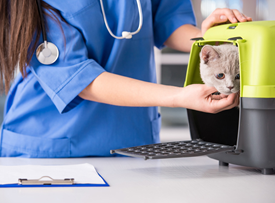Minimise the stress of visiting the vet
No one loves visiting the doctor. Likewise, our pets may not be fond of a visit to the vet. The stress of visiting the vet can mean you opt not to. Putting it off may seem like an easier option at the time, but it could leave your pet with serious health issues that may become complicated to treat.
We know bringing your pet to us can be stressful. There are lots of smells, sounds, pets, people, and unfamiliar surroundings that can make pets feel anxious, not to mention the challenge of the car trip.
There are many ways to help minimise the stress of visiting the vet and make it a positive experience for both you and your pet.
Cats
Cats are sensitive creatures who are easily disturbed by sudden change. Here are some tips for bringing your feline friend to the vet:
- leave the carrier open at home for a few days prior to the visit. This will allow your cat to explore and become familiar with the carrier
- line the carrier with something soft like a towel or bed
- Feliway spray the carrier prior to putting your cat inside to alleviate stress

- calmly place them into the carrier I
- if your cat is reluctant to travel, wrap them gently in a towel that has their scent or a pheromone spray like Feliway
- place a towel over the carrier so they can’t see out to reduce stress
- secure the cat carrier on the back seat of your car with the seatbelt, or against the front seat
- drive smoothly, without loud music, talking to your cat in a soothing voice
- if possible, keep windows closed for extra safety
- when you arrive at the clinic, place the carrier in the waiting room away from dogs and facing away from other cats
- bring treats to reward good behaviour
Dogs
For dogs, it’s often the car trip that creates the most anxiety. Making minimum fuss when you’re about to visit the vet is key, as our canine companions are experts at reading your emotional signals. If you’re nervous or anxious, your dog will pick up on that.
It’s a good idea to get your dog familiar with being examined from head to toe. Touching your dog’s feet, lifting their ears and lips and running your hands over their tummy and can be helpful to desensitise handling issues.
Other tips to make the process easier include:
- be calm and positive about the car journey
- avoid feeding your dog approximately four to six hours before the car journey
- spend time with them inside the vehicle while it’s stationary
- once they feel relaxed in the car, take them on very short trips, say around the block, before progressing to longer journeys
- keep your pet relaxed by giving lots of physical attention and talking softly whilst in the waiting room
- bring treats for positive reinforcement
In addition to these techniques, you can always pop by and visit your local Greencross Vets team at any time. A visit to us now and again that involves, cuddles, pats and a treat rather than being in a consultation environment, can help to desensitise your pet to the environment. You never know, a trip to the vet could become their favourite outing.
Travel Safety Tip
Always remember to safely restrain your pet in the car. An unrestrained pet is a distraction to the driver, particularly if they are a little nervous.
If your pet is nervous to visit the vet, please feel free to give your local Greencross Vets team a call prior to your appointment, and we can talk you through these tips.

 Greencross Vets
Greencross Vets 




